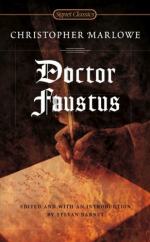|
|
Dr. Faustus Author/Context
Christopher Marlowe was born around February 26, 1563 or 64, the precise date is not recorded (William Shakespeare is reported to have been born two months after Marlowe). He was baptized at St. George’s Church in Canterbury. His father, John, was a well-to-do shoemaker; his mother, Catherine, was the daughter of the rector of St. Peter’s. Christopher was the second of nine children. At the age of fifteen, Marlowe entered the King’s School (W. Somerset Maughm is an alum) and two years later, entered Corpus Christi College, Cambridge University. He received his bachelor’s degree in 1584, and continued on for a master’s degree on a scholarship designated for those studying for the clergy.
In 1587, he was denied a M.A. because of his failure to meet the residency requirements of the scholarship. But the Queen’s Privy Council interceded on his behalf, and he was able to obtain the degree. Even as an undergraduate, Marlowe was known to have made extended trips overseas. Added to that were records of his service to the government, all of which confirm that Marlowe served as a government informant, or as a spy in some manner or capacity. The extent of his life as a spy is not known, but Marlowe certainly made acquaintances with high-level government officials, as well as with notorious figures in the London underworld.
Consistent with his double life as a spy, Marlowe lived a colorful life. He was once roommates with another prominent Elizabethan writer, Thomas Kyd. Marlowe also frequented the house of Sir Walter Raleigh, the famous adventurer and man of letters. He shared many of Sir Walter Raleigh’s unorthodox political and religious views, which branded Marlowe as an atheist. In 1589, Marlowe was arrested for aiding in a murder but was later acquitted. Trouble did not leave him, however, as he continued to live an interesting, albeit dangerous life. In 1593, while at a Tavern in Deptford with three other shady characters, Marlowe was killed in a fight. He was supposedly stabbed to death by one of his acquaintances over a backgammon game. Marlowe was only twenty-nine years old. There has been much speculation about the suspicious nature of his death, but there has not been much evidence to disprove the official story.
Though he lived an eccentric life, Marlowe was foremost a writer, one of the most popular writers of the Elizabethan drama, and one of the greatest playwrights England has produced. He was also a classical scholar who regarded antiquity as the main source of his literary inspiration. He was influenced by the Latin writers, Ovid, Virgil, and Lucan. He wrote his first play, Tamburlaine the Great, while he was at Cambridge. The play was first performed in 1587 to critical success. He probably wrote Dr. Faustus a year before his death. It was published in 1604. His other noted works include Edward II, published in 1594 and The Jew of Malta, published in 1633.
Marlowe’s works have many consistent themes. His protagonists are often fierce individualists who reject Christian beliefs. Thus Kocher sees in Marlowe a precursor of the Renaissance Man. Marlowe’s influence on Shakespeare is rightfully noted, however, many literary critics believe that Marlowe was a poetic genius in his own right.
Bibliography
Kocher, Paul H. Christopher Marlowe: A Study of his Thought, Learning, and Character. Chapel Hill: The University of North Carolina Press, 1946.
Marlowe, Christopher. Dr. Faustus. New York: Dover Publications, Inc., 1994.
Poirier, Michel. Christopher Marlowe. London: Chatto and Windus, 1951.




